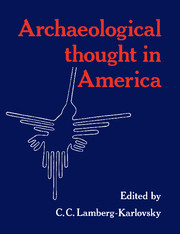Book contents
- Frontmatter
- Contents
- List of illustrations
- Introduction
- Part I History, method, and theory
- 1 History and contemporary American archaeology: a critical analysis
- 2 Aspects of the application of evolutionary theory in archaeology
- 3 The “New Archaeology,” then and now
- 4 Marxism in American archaeology
- 5 Formal approaches in archaeology
- 6 Ideology and evolutionism in American archaeology: looking beyond the economic base
- 7 The present and the future of hunter-gatherer studies
- 8 Paleopathology and the interpretation of economic change in prehistory
- Part II Archaeology in the Americas and beyond
- References
- Index
4 - Marxism in American archaeology
Published online by Cambridge University Press: 06 July 2010
- Frontmatter
- Contents
- List of illustrations
- Introduction
- Part I History, method, and theory
- 1 History and contemporary American archaeology: a critical analysis
- 2 Aspects of the application of evolutionary theory in archaeology
- 3 The “New Archaeology,” then and now
- 4 Marxism in American archaeology
- 5 Formal approaches in archaeology
- 6 Ideology and evolutionism in American archaeology: looking beyond the economic base
- 7 The present and the future of hunter-gatherer studies
- 8 Paleopathology and the interpretation of economic change in prehistory
- Part II Archaeology in the Americas and beyond
- References
- Index
Summary
Introduction
When Philip Kohl and I sought to organize a session on “Marxist approaches to archaeological research” for the 1974 meetings of the American Anthropological Association, we faced the problem of identifying American archaeologists who were Marxists. Numbers of anthropological archaeologists had done work which might be related to Marxist approaches, but this research did not in any explicit way acknowledge its debt to a theoretical perspective emphasizing the primary significance of the relations of production to the dynamics of social change. Indeed, more than one of those whom we invited to participate in the session responded that they were unfamiliar with Marxist theory and its possible relation to their work. As Spriggs (1984: 7) has commented:
It is only since the mid-1970s that an appreciable number of Western archaeologists have stated their interest in Marxist theory. There have of course been many other “closet” or “hidden” Marxists: those using theories clearly derived from Marxism but who have not chosen to identify the source of their ideas. It is not my intention to “expose” these authors but included among their number are several of the better-known archaeologists of the 1960s and 1970s.
The marginal position of Marxism in American archaeology even now is well expressed in the somewhat apologetic title of Spriggs's article (“Another way of telling …”). This marginality derives from various circumstances.
- Type
- Chapter
- Information
- Archaeological Thought in America , pp. 63 - 73Publisher: Cambridge University PressPrint publication year: 1989
- 8
- Cited by



